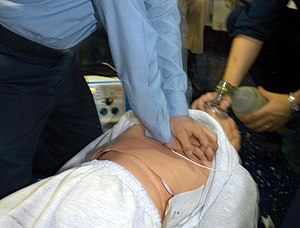What does cardiopulmonary arrest mean?
Definitions for cardiopulmonary arrest
car·diopul·monary ar·rest
This dictionary definitions page includes all the possible meanings, example usage and translations of the word cardiopulmonary arrest.
Princeton's WordNet
asystole, cardiac arrest, cardiopulmonary arrestnoun
absence of systole; failure of the ventricles of the heart to contract (usually caused by ventricular fibrillation) with consequent absence of the heart beat leading to oxygen lack and eventually to death
Wikipedia
cardiopulmonary arrest
Cardiac arrest is when the heart stops beating. It is a medical emergency that, without immediate medical intervention, will result in cardiac death within minutes. When it happens suddenly, it is called sudden cardiac arrest. Cardiopulmonary resuscitation (CPR) and possibly defibrillation are needed until further treatment can be provided. Cardiac arrest results in a rapid loss of consciousness, and breathing may be abnormal or absent.While cardiac arrest may be caused by heart attack or heart failure, these are not the same, and in 15 to 25% of cases, there is a non-cardiac cause. Some individuals may experience chest pain, shortness of breath, nausea, an elevated heart rate, and a light-headed feeling immediately before entering cardiac arrest.The most common cause of cardiac arrest is an underlying heart problem like coronary artery disease that decreases the amount of oxygenated blood supplying the heart muscle. This, in turn, damages the structure of the muscle, which can alter its function. These changes can, over time, cause ventricular fibrillation (V-fib), which most commonly precedes cardiac arrest. Less common causes include major blood loss, lack of oxygen, very low potassium, electrical injury, heart failure, inherited heart arrhythmias, and intense physical exercise. Cardiac arrest is diagnosed by the inability to find a pulse.CPR and defibrillation can reverse a cardiac arrest, leading to return of spontaneous circulation (ROSC), but without such intervention, it will prove fatal. In some cases, cardiac arrest is an anticipated outcome of serious illnesses where death is expected. Treatment for cardiac arrest includes immediate CPR and, if a shockable rhythm is present, defibrillation. Two protocols have been established for CPR: basic life support (BLS) and advanced cardiac life support (ACLS). Among those whose pulses are reestablished, targeted temperature management may improve outcomes. In addition, the care team may initiate measures to protect the patient from brain injury and preserve brain function. In post-resuscitation care, an implantable cardiac defibrillator may be considered to reduce the chance of death from recurrence.In the United States, approximately 535,000 cases occur annually (about 13 per 10,000 people). Of these, 326,000 (61%) experience cardiac arrest outside of a hospital setting, while 209,000 (39%) occur within a hospital. Cardiac arrest becomes more common with age and affects males more often than females.The percentage of people who survive out-of-hospital cardiac arrest (OHCA) with treatment by emergency medical services is about 8%. Fiction has often portrayed the immediate survival rate of cardiac arrest to be unreasonably high. This may contribute to misinformed expectations of resuscitative efforts from the general public, with many studies showing the expected survival rate of resuscitative efforts after cardiac arrest exceeding 40–50%. These portrayals may also contribute to a patient's or medical decision maker's desire to pursue aggressive measures. One study suggests many of the critically ill are less likely to choose resuscitation when given accurate information about its limitations.In the event that cardiopulmonary resuscitation is successful, complete recovery is not guaranteed as many survivors experience an array of disabilities, including partial paralysis; seizures; difficulty with walking, speaking, or memory; limited consciousness; or persistent vegetative state and brain death.
ChatGPT
cardiopulmonary arrest
Cardiopulmonary arrest, also known as cardiac arrest, is a sudden loss of blood flow resulting from the failure of the heart to effectively pump blood. This happens when the heart's electrical system, which controls the heartbeat, malfunctions and causes the heart to stop beating completely. This condition is a life-threatening emergency that requires immediate medical attention. It can lead to the absence of pulse, unconsciousness, and cessation of breathing. If not treated immediately, it can result in death or permanent damage to the brain and other vital organs due to lack of oxygen.
Matched Categories
Numerology
Chaldean Numerology
The numerical value of cardiopulmonary arrest in Chaldean Numerology is: 9
Pythagorean Numerology
The numerical value of cardiopulmonary arrest in Pythagorean Numerology is: 5
Translations for cardiopulmonary arrest
From our Multilingual Translation Dictionary
- కార్డియోపల్మోనరీ అరెస్ట్Telugu
- kardiyopulmoner arrestTurkish
- کارڈیپلمونری گرفتاریUrdu
- ngừng tim phổiVietnamese
Get even more translations for cardiopulmonary arrest »
Translation
Find a translation for the cardiopulmonary arrest definition in other languages:
Select another language:
- - Select -
- 简体中文 (Chinese - Simplified)
- 繁體中文 (Chinese - Traditional)
- Español (Spanish)
- Esperanto (Esperanto)
- 日本語 (Japanese)
- Português (Portuguese)
- Deutsch (German)
- العربية (Arabic)
- Français (French)
- Русский (Russian)
- ಕನ್ನಡ (Kannada)
- 한국어 (Korean)
- עברית (Hebrew)
- Gaeilge (Irish)
- Українська (Ukrainian)
- اردو (Urdu)
- Magyar (Hungarian)
- मानक हिन्दी (Hindi)
- Indonesia (Indonesian)
- Italiano (Italian)
- தமிழ் (Tamil)
- Türkçe (Turkish)
- తెలుగు (Telugu)
- ภาษาไทย (Thai)
- Tiếng Việt (Vietnamese)
- Čeština (Czech)
- Polski (Polish)
- Bahasa Indonesia (Indonesian)
- Românește (Romanian)
- Nederlands (Dutch)
- Ελληνικά (Greek)
- Latinum (Latin)
- Svenska (Swedish)
- Dansk (Danish)
- Suomi (Finnish)
- فارسی (Persian)
- ייִדיש (Yiddish)
- հայերեն (Armenian)
- Norsk (Norwegian)
- English (English)
Word of the Day
Would you like us to send you a FREE new word definition delivered to your inbox daily?
Citation
Use the citation below to add this definition to your bibliography:
Style:MLAChicagoAPA
"cardiopulmonary arrest." Definitions.net. STANDS4 LLC, 2024. Web. 26 Apr. 2024. <https://www.definitions.net/definition/cardiopulmonary+arrest>.



Discuss these cardiopulmonary arrest definitions with the community:
Report Comment
We're doing our best to make sure our content is useful, accurate and safe.
If by any chance you spot an inappropriate comment while navigating through our website please use this form to let us know, and we'll take care of it shortly.
Attachment
You need to be logged in to favorite.
Log In